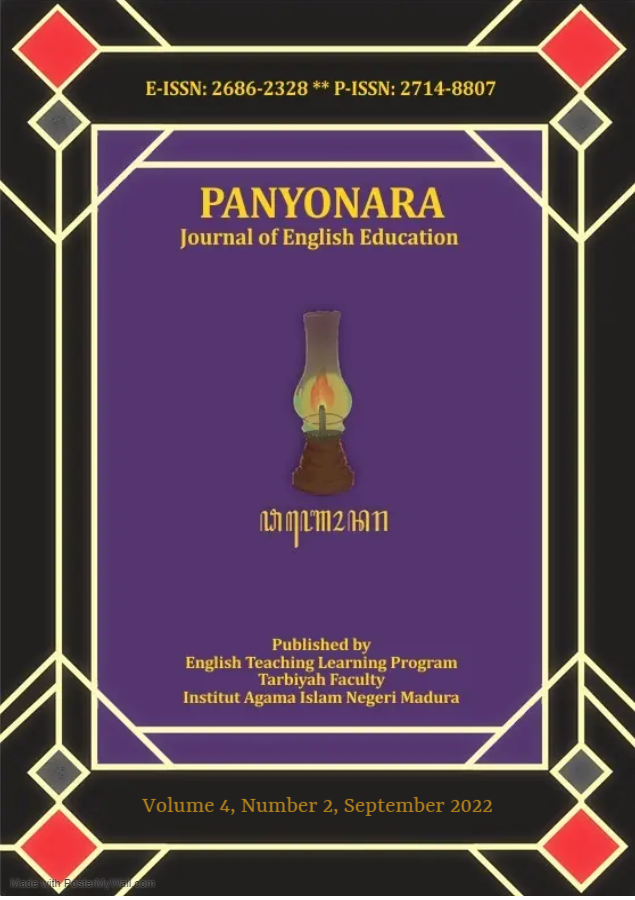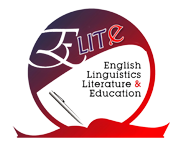The Analysis of Students Politeness Response on Lecturer Request by Voice Message in WhatsApp Group at Fifth Semester of TBI 2021 IAIN Madura Based on Brown and Levinson Perspective
 Abstract views: 311
,
Abstract views: 311
,
 PDF downloads: 380
PDF downloads: 380
Abstract
Language is used for communication to convey one's intention to each other in social interaction. From the language, someone has a different ways to speak with the other people, such as someone speaks with their parent, their friend, their teacher and so on. With a different partner to communicate, people do the different way to speak in every aspect, especially in politeness aspect. In this thesis, the researcher uses the sample of every class of fifth semester of TBI 2021IAIN Madura as a subject. The researcher researches about politeness response by voice message of the subject. The focus of the study is what is the types of politeness used and analyzing how are the politeness used by students of fifth semester of TBI 2021IAIN Madura in response lecturer request by voice message in WhatsApp group based on Brown and Levinson perspective. Then, the objective of this research is to analyze the types of politeness to know the politeness used by students of fifth semester of TBI2021 IAIN Madura in response lecturer request by voice message in Whatsapp group based on Brown and Levinson perspective. The approach of this study is qualitative approach and uses content analysis. The kind of this research is library research. The data is taken from voice message in Whatsapp group. Then, the researcher collects the data through the observation and documentation and analyze the data which use politeness strategy.The result of this research is there are three types of politeness available in the WhatsApp group of fifth semester of TBI 2021 IAIN Madura based on Brown and Levinson perspective. They are positive politeness, negative politeness and off record. While bald on record is not available in this research because the use of bald off record is usually used for close friend and family. The use of sub politeness also known by the utterance that used of fifth semester of TBI 2021 IAIN Madura, such as the use of be incomplete and give hints or clue of off record, assert or presuppose speaker’s knowledge of and concern for hearer’s wants of positive politeness and minimize the size of imposition of negative politeness. Most of students use positive politeness in responding the lecturer.
Downloads
References
Anjani, R. (2021). Voice Note Response of Fifth Semester of TBI Students 2019.
Brown, P., & Stephen, C. L. (1987). Politeness: Some Universals in Language Usage. Cambridge University Press.
Damanik, D. (2021). Language Politeness in the Conversation between Lecturers in WhatsApp Chatting Group.
Dictionary, O. (2008). Oxford Learner’s Pocket Dictionary. Oxford University Press.
Jamaluddin. (2021). Voice Note Response of Fifth Semester of TBI Students 2019.
Mahmud, M. (2019). The Use of Politeness Strategies in the Classroom context by English University Students.
Miri, M. (2006). Introducing Sociolinguistics. Rutledge.
Mulyono, Herry. (2019). Politeness Strategies in Teacher-Student WhatsApp Communication.
Pratama, H. (2019). Linguistic Politeness in Online Communication.
Rahmi, G. (2020). Students' Politeness Strategies in Texting a Lecturer.
Ulrich. (2005). Sociolinguistic (Second Edition). L.p.
Wardaugh, R. (2006). An Introduction to Sociolinguistics (Fifth Edition). Blackwell Publishing.
Watt, R. J. (2003). Politeness. Cambridge University Press.
Widya, R. (2020). An Analysis of Politeness Strategies on Comments Indonesians Politicians Twitter Account.
Yule, G. (2010). The Study of Language. Cambridge University Press.
The journal uses an Open Access policy under a Creative Commons Attribution-NonCommercial 4.0 International License. Authors who publish with this journal agree to the following terms:
- Authors retain copyright and grant the journal right of first publication with the work simultaneously licensed under a Creative Commons Attribution License that allows others to share the work with an acknowledgment of the work's authorship and initial publication in this journal.
- Authors are able to enter into separate, additional contractual arrangements for the non-exclusive distribution of the journal's published version of the work (e.g., post it to an institutional repository or publish it in a book), with an acknowledgment of its initial publication in this journal.
- Authors are permitted and encouraged to post their work online (e.g., in institutional repositories or on their website) prior to and during the submission process, as it can lead to productive exchanges, as well as earlier and greater citation of published work.
















